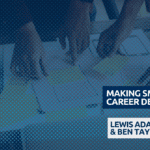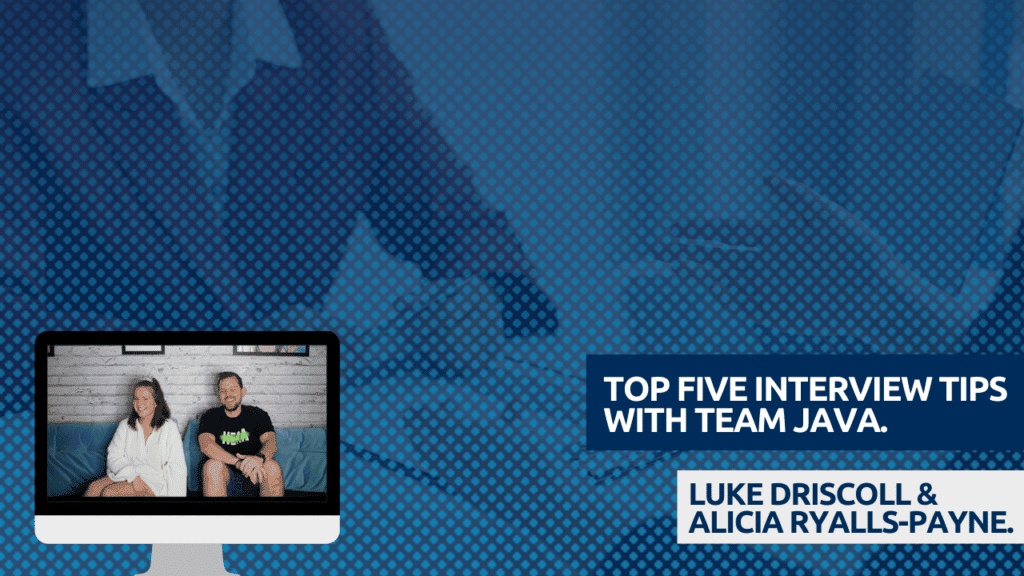Making Smarter Tech Career Decisions

**LINKS TO THIS EPISODE OF THE RECDOTECH PODCAST**
LISTEN ON SPOTIFY: https://open.spotify.com/episode/5T7XZnYcT9MwpHK0BWu9aR
LISTEN ON APPLE PODCASTS: https://podcasts.apple.com/us/podcast/making-smarter-tech-career-decisions-ben-taylor-datarobot/id1529453970?i=1000492126909
LISTEN ON GOOGLE PODCASTS: http://bit.ly/39Lb0wb
RECDOTECH PODCAST EPISODE 5 AVAILABLE NOW
**Making Smarter Tech Career Decisions with Ben Taylor (click 4 sound) @ DataRobot**
“An interview is short and a resumé is much shorter.
Your resumé will hold someone’s attention for 5-30 seconds.
With algorithms, you might not get looked at, at all.
You could get screened out.’
So how can you build your profile so it is seen by the right people?
Ben Taylor (click 4 sound), Chief AI Evangelist at DataRobot offered his expert advice, in the latest episode of the RecdoTech podcast with Lewis Adams-Dunstan.
He gives his opinion of the different ways to boost your profile in the tech space covering all areas;
From MeetUps, blogging and Kaggle,
to internships, consulting, and engaging in Open-Source projects.
If you’re looking to boost your profile, you don’t want to miss this one.
Transcription:
Lewis: So this is going to be an episode of preparing the unprepared talking to Ben Taylor, we’ve spoken more on a data science recruitment level and we’re going to kind of touch on a couple of those things anyway. But I know Ben is not only a great scientist, but also has a few kids of his own. And I’m keen on kind of digging a little bit deeper into how you manage both of those things so well. So welcome back.
Ben: Yeah.Yeah. Thanks for having me. I am reminded of back before I had my first kid being very analytical and trying to assign numbers to everything. I started interviewing a lot of people around me and asking for the coefficient or the number. I wanted to know how much more you loved your own kids than you’re your nephew and niece. And I was curious. I actually wanted people to give me a number, because what I was scared about is, I love my nephews and nieces, but I don’t want to keep them. So if I had to keep them 24/7, that’s a problem, and if I like my kids as much as my nephews and nieces, that’s a problem, then maybe I don’t want to have kids. And, yeah, and all that goes out the window because you have your first kid and it’s one of the most memorable experiences of your life. You know the thing I realized is you want to have them on their worst days. So you’ve seen a kid in the store and they’re throwing a fit or they’re laying on the floor and you’re thinking, jeez, I wouldn’t want to be that parent right now, but, you would still want your kid. Your kids can still be a burden where you love them, but they’re almost a necessary inconvenience. But I think I had a big breakthrough personally where I really changed my view, where my kids became my purpose, and then everything was great. So like taking my kid’s skiing before, I’d be thinking about the opportunity cost, all the work I had to get done, what I could be doing or stuff that was much more selfish, that I could be back-country skiing with adults and having really good skiing experiences, I’d actually be thinking about that. Where I noticed when I started thinking about my kids as my purpose, I fell in love with all of it. So skiing with my kids, we’re going down these green runs, which aren’t that engaging or exciting for me. I am just totally immersed in what they’re doing in the moment. And if it takes two hours, four hours, eight hours, 12 hours, I have no time anxiety when I’m in the moment with my kids. But that was very different. Yeah, so, it’s getting better.
Lewis: Well, I think my kind of goal is as an expectant parent is, over the years, and not necessarily be like popular with my kids, but to make it my mission to kind of shepherd them to guide and lead them. I feel like I don’t know how much crossover there is because I literally have no experience in parenting. But when it comes to leading a team, do you find that being a leader within a business, having a bunch of maybe not data scientists, but whoever is beneath you or working with you, do you think it helped when it came to parenting? Probably not, because, so I’ll give you an example of why? So when you’re leading a team of data scientists, they’re not going to punch you in the crotch or they’re not going to, like, throw a banana at your head or something. And so there’s definitely a new frontier as a parent where you have to figure out how to not be emotional. And that that is actually really challenging because your kids will make you angry. It’s not very often that you’re having rational conversations with your children. They don’t want to do their chores. They’re fighting all the time. They’re doing these things. So be prepared for your children to do things that if you’re not prepared, they actually might set you off like you. You will be angry.
Lewis: That can be quite difficult though in that sense because if you are, in my case, two new parents and you don’t have experience with that, adding all of the other pressures around how you might be feeling in the time as well when it comes to work when it comes to life, and then also being a parent, it’s gonna be quite difficult to really figure out whether you’re angry in the moment or if it’s just all the outside pressures. Ben: Yeah, no, it’s hard because when you have other outside pressures that are building up, especially if you’re both working, you’ve got other things going on, I think it’s really important to find opportunities for both parents to be selfish. Now, I’m going to be doing a separate podcast where we actually talk about mothers in tech as well. But generally speaking, I don’t think guys stand up and say that they’re finding things difficult when it comes to parenting. And as you said, you make mistakes and it’s OK to find it challenging. So this kid discussion definitely plays into technology because the greatest computer on planet Earth is your child’s mind. They know a lot more about emotional intelligence than you realize. You and I didn’t get a Ph.D. in how to teach humans to speak English, we just interact with them and they figure it out on their own and you actually don’t even have to correct them. So if a child is. Yeah, so I don’t I don’t want to sidetrack this discussion. You could have an entire discussion just on how humans learn a language and how fascinating it is because children will learn from mistakes. They’ll begin to attach verb endings to irregular verbs like GoED instead of went or something. But their brain is quickly building these rules that initially you’re going to try to correct them, like, oh, knock that off. That’s not how you say that. You actually don’t even have to correct them. They’ll self-correct. So if your child is saying something completely wrong and you just keep talking to them, they’re going to self-correct because their brains are eventually they’ll figure it all out. You don’t need it. You don’t need to sit down and hammer an irregular verb discussion with your kid is figure it out.
Lewis: A quick question on that. And I don’t know if it’s got a quick answer, but do you think that we can ever humanize technology to the point where it’s able to think like a baby or like a human and really, really learn?
Ben: So this is a big controversial topic in AI and tech, and it’s a very exciting one. A lot of people will say, no, they’ll disagree. I think the answer is yes.
Lewis: Interesting.
Ben: I think we’re still far away. The approaches with deep learning and GPT-3, these big breakthroughs, and I didn’t come up with this analogy. This other researcher I was talking to brought this up and I thought it was great. He said, look. Humans saw birds flying and then they built an airplane, they built a Boeing 747, and what is a Boeing 747 have to do with the miracle of flight? Well, it sort of got it right. And then they just use, like, this massive hammer to just do it. But is it flying like a bird? No, not at all. Or you look at how an insect flies? Not at all. Even the ways that a bird and insect get lift and maintain flight and their flight efficiency. Not at all. That’s not how a plane works. Same thing with GPT-3 and deep learning. You have GPT-3 with 175 billion neurons and you might say, wow, like what happens when they have more neurons than our brain? Well, I’ll give you the answer. Nothing, like, this thing doesn’t become conscious. We’re building the wrong thing. That’s not how children learn a language. And it’s pretty easy to show when you break it all down that deep learning is kind of missing the boat like the approach and other researchers have brought this up. Hinton has brought this up. He’s been frustrated. He’s looked at capsule networks. He’s trying to figure out how to get closer to how a human learns. And this is something I’m very excited about. I’d love to kind of do some demonstrations or have some breakthroughs the next three years to show that, look, this is a milestone that deep learning had no chance of doing, but we’re doing it. so a big milestone for me. would be teaching a computer to learn a language through experience. And by language, I don’t mean like it doesn’t have to be fluent in English, but just demonstrate that it can learn like a 16-month-old child or and we don’t have any words they learn first. They’ll learn their ten words. Normally they learn nouns first and verbs that grow over time. So, yeah. So I think the answer is yes.
Lewis: I was going to ask in terms of like technology that we have available to us today that enhances the ability of our children to learn. Did you use any apps, was there any specific hardware that you used?
Ben: The way we educate humans today sucks. So you throw thirty kids in a room with a boring-ass teacher like no insult to most teachers, but like a lot of us, it’s pretty boring for the kids. Like we’ve got a child. He’s six, he’s got a learning disability and he’ll ask if he can play Prodigy. And so Prodigy is like this math game, he’s asking if he can do school. And if I sat down and said, hey, let me teach you math, he would complain. But that shows you the power of gamification. So I am a huge fan of that.
NÄCHSTE SCHRITTE.










